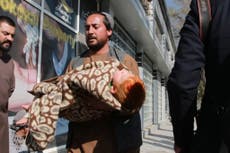Military watchdog claims no misconduct in botched Afghanistan drone strike
Lieutenant General says mistaken airstrike ‘was not unreasonable. It just turned out to be incorrect’
A military watchdog has claimed that there was no misconduct or negligence in the botched US drone strike against a target in Kabul that killed 10 innocent civilians, including seven children.
The independent Pentagon review doesn’t recommend that any disciplinary action be taken. The inspector general of the Air Force, Lieutenant General Sami Said, led the review process and found that there were breakdowns in communications as well as in the process of finding and confirming the target for the airstrike. But he also added that the mistake occurred despite that measures were taken to prevent civilian casualties.
“I found that given the information they had and the analysis that they did – I understand they reached the wrong conclusion, but ... was it reasonable to conclude what they concluded based on what they had? It was not unreasonable. It just turned out to be incorrect,” Lt Gen Said said. He’s considered to be independent as he has no connection to the operations in Afghanistan.
The inspector general said the botched strike must be considered in context – stressed US forces were working under heavy pressure just days after a suicide bombing that had killed hundreds of Afghans and 13 US service members on 26 August.
They received large amounts of information about threats to the airport as they worked feverishly to facilitate the international airlift of Afghan allies, refugees, and international citizens. Afghans in the thousands surrounded the airport as they tried to get away from the Taliban.
Lt Gen Said said that better communications between those deciding whether to launch the strike and other personnel may have prompted more doubts to be raised but may not have prevented the strike.
The airstrike took place on 29 August, hitting the white Toyota Corolla sedan of 37-year-old Zemerai Ahmadi, an employee of a US humanitarian organisation. The inaccurate intelligence came days after an ISIS-K suicide bomber killed 13 Americans and 169 Afghans at the airport.
Lt Gen Said said US forces believed the car posed a threat and that they needed to strike it before it got to the airport.
“They all have a genuine belief based on the information they had and the interpretation, that that was a threat to US forces, an imminent threat to US forces,” he said during a briefing at the Pentagon. “That’s a mistake. It’s a regrettable mistake. It’s an honest mistake. I understand the consequences, but it’s not criminal conduct, random conduct, negligence.”
He added that two minutes before the strike, there was evidence of a child being in the strike zone, but that the deciding forces didn’t see the child.
“I’m just saying it is 100 per cent not obvious,” he said. “You have to be like, no kidding, looking for it. But when you’re looking for it, certainly after the fact, if you ask me, was there evidence of the presence? Yes, there was.”
Steven Kwon, the president of Mr Ahmadi’s employer Nutrition and Education International, said: “According to the Inspector General, there was a mistake but no one acted wrongly, and I’m left wondering, how can that be?”
“Clearly, good military intentions are not enough when the outcome is 10 precious Afghan civilian lives lost and reputations ruined,” he added in the statement.
The review from the inspector general suggests that more be done to prevent “confirmation bias” – that forces making the decision to launch the strike were too quick to decide that what they were seeing on the ground matched their intelligence of an impending terror attack and confirmed their decision to strike what was later revealed to be the wrong vehicle.
Pentagon officials claimed for days after the strike that the drone attack had been correct despite an increasing number of reports that it had targeted innocent civilians.
While the inspector general hasn’t recommended any disciplinary actions, Lt Gen Said said that commanders could look at the review and learn that there was “subpar performance” and decide to decredential, retrain, or fire some staff.
“You should not perceive the fact that I didn’t call any individual out with accountability that it does not mean that the chain of command won’t,” he said.
The US is currently working to pay reparations to the family and to possibly get them out of the country.
A review by US Central Command found that US forces tracked the vehicle for around eight hours and decided to strike in an “earnest belief” that the car was carrying explosives and that it was a threat to troops at the airport.
The US troop presence ended just days later, with the Taliban now in power of the country.
The Associated Press contributed to this report
Join our commenting forum
Join thought-provoking conversations, follow other Independent readers and see their replies
Comments


Bookmark popover
Removed from bookmarks